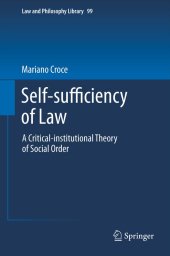 Neuerscheinungen 2014Stand: 2020-02-01 |
Schnellsuche
ISBN/Stichwort/Autor
|
Herderstraße 10
10625 Berlin
Tel.: 030 315 714 16
Fax 030 315 714 14
info@buchspektrum.de |

Mariano Croce
Self-sufficiency of Law
A Critical-institutional Theory of Social Order
2012. 2014. xxx, 218 S. 235 mm
Verlag/Jahr: SPRINGER NETHERLANDS; SPRINGER 2014
ISBN: 9400794819 (9400794819)
Neue ISBN: 978-9400794818 (9789400794818)
Preis und Lieferzeit: Bitte klicken
This text presents a theory of law to account for the role of the field of law in the construction of social reality. It examines notions of rule, coercion, institution and practice in the fields of legal positivism, legal institutionalism and legal pluralism.
The book investigates the role of law and legal experts in the organisational dynamics of a population, demonstrating that law is a stable practice among those who (in virtue of the special knowledge they master) are called upon to select the ´normative facts´ of a population, i.e. the interactional standards that are proclaimed as binding for the entire population by the publicly recognised legal experts (whose peremptory judgments can be only revised by peers). It proposes an integration of the recent research outcomes achieved in three different areas of study: legal positivism, legal institutionalism and legal pluralism and examines the notions of rule, coercion, institution, practice elaborated by significant theorists in the mentioned areas and illumine both their merits and flaws. Furthermore it advances a notion of law and a description of the legal field which are able to account for the nature of the legal filed as the cradle of the social order. new back cover copy: In an era characterized by a streaking global pluralism, the collapse of many state agencies, the emergence of multiple sources of law, and the rise of informal justice, the idea of a unitary and homogenous legal system seems old-fashioned. But philosophers, sociologists and anthropologists still hold many debates on the nature of law and its function, which is that law represents an institution that characterizes any orderly social context of human beings, and this book plunges into the center of those debates. Self-sufficiency of Law: A Critical-institutional Theory of Social Order investigates the role of law and legal experts in the organizational dynamics of a population. It demonstrates that law is a stable practice among those who are called upon to select the "normative facts" of a population, that is, the interactional standards that are proclaimed as binding for the entire population by the publicly recognized legal experts. To do this, the author proposes an integration of the recent research outcomes achieved in three different areas of study-legal positivism, legal institutionalism and legal pluralism. He examines the notions of rule, coercion, institution and practice elaborated on by significant theorists in these fields, highlighting both the merits and flaws and ultimately advancing a notion of law and a description of the legal field which are able to account for the nature of the legal field as the cradle of social order. This text covers key guidelines for empirical research and political activities in Western and non-Western countries.
Introduction.- Part I. Law as a complex practice: the rule-based model .- Overview.- 1. Legal theory as a scientific discipline and the variety of rules.- 2. Legal validity and the problem of rule-acceptance .- 3. Reflective acceptance: reasons for action and criterion-rules.- 4. The legal practice and its (vanishing) borders .- Part II. Law as a selective practice: the social and the legal.- Overview.- 5. The pluralist divide.- 6. Legal pluralism revised: law as the product of selection.- 7. Classic institutionalism: jural reality and legal selection.- 8. Exploring the jural continuum .- Part III. The law as a special practice: legal field and social reality.- Overview .- 9. Negotiating reality: knowledge and categories in the legal field.- 10. The ritual dimension of law: normality, normativity, and critique.- Epilogue: defending a pluralist critical-institutional view of law.- Bibliography.- Index.


